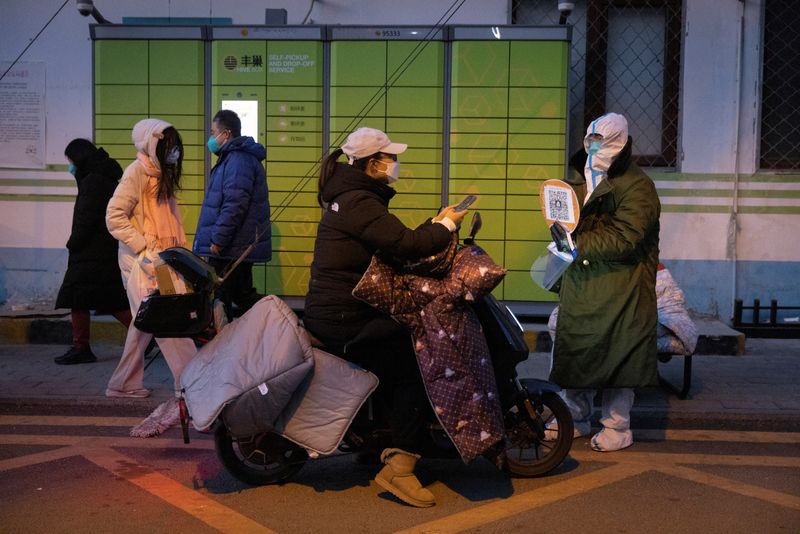By Andrew Silver
SHANGHAI (Reuters) - With more than a full year past since China eased restrictions and let COVID-19 sweep its households, scientists are worried a unique opportunity may be slipping away to study long COVID from possibly hundreds of millions of infections in that country.
Global disease experts say little is known about China's experience with long-term COVID effects, which in Britain, Canada, the U.S. and elsewhere are thought to have afflicted millions with debilitating fatigue, brain fog and other symptoms that persist for months or even years.
China's rare circumstances - relying on home-grown vaccines and mostly avoiding COVID until late in the pandemic - could, these experts say, provide particularly valuable data and insights on long COVID.
But national agencies' funding plans and comments from scientists and policy experts in China suggest that interest in public health-related COVID studies may be waning in the country's research community, like it has elsewhere, as memories fade of stay-at-home orders and close contact tracing.
"The majority of COVID cases in China emerged less than a year ago," Martin Taylor, the World Health Organization's China representative, said in an emailed reply to queries.
Chinese research might, he said, offer a different view from other countries and help to shed light on the causes, prevalence and risk factors of long COVID, which are still not clearly understood.
"Given that situation, WHO encourages more research in China."
But academics point to signs China may be deprioritising or even backing away from public health-related COVID research, including at government agencies that offer grants and academic journals that publish research studies.
"I haven't heard much at all about long COVID, or research on long COVID, despite a wave last winter in which a very large fraction of the population were infected for the first time," said Ben Cowling, an epidemiologist at the University of Hong Kong.
"I'm quite surprised about that, but I am aware that it could be a sensitive topic ... I think the country wants to put COVID behind it."
LONG COVID STUDIES
In one research programme's call for proposals, the National Office for Philosophy and Social Sciences did not include pandemic-related topics, although it had in the past, while the National Natural Science Foundation of China has cut projections for the number of projects to be funded under one COVID research programme, according to documents posted on their websites.
Some researchers noted, however, that funding might be available elsewhere, and indeed the Natural Science Foundation this year offered special grants for research on anti-COVID drugs and COVID-related basic science.
The two agencies did not reply to requests for comment.
Chinese researchers have also published a number of recent studies on long COVID, with more expected.
A study published in November found that half of a set of COVID-19 patients discharged from a Wuhan hospital in early 2020 still had symptoms - mostly mild - three years later. Another study in Beijing published in October found that 28.7% of a group of infected healthcare workers and 39.2% of a group of infected residents still had COVID symptoms five months after they were infected.
But several academics and doctors in China said a variety of concerns have made the research community increasingly wary about long COVID, including sensitivities around bio-data security and policymakers' eagerness to put the pandemic behind them.
"Although the government's investment is continuing ... the interest of the country's researchers seems to be falling," said Tan Hao, an academic at Hunan University's Emergency Science Research Center. He has urged creating a platform for long COVID where patients could receive guidance and support.
China's National Health Commission said in a faxed reply to queries that the country supported scientific researchers looking at the coronavirus.
Regarding long COVID, it said Chinese and international research so far suggested the rate of occurrence is low, organ damage is fairly rare, and symptoms gradually improve with the passage of time.
Other relevant agencies and ministries contacted for comment, including the Ministry of Science and Technology and China's State Council, referred Reuters to China's National Health Commission or did not respond.
Many countries have played down the significance of long COVID, or even failed to acknowledge it as a condition, but China's large population and unique circumstances give it a particularly essential role to play in long COVID research, according to several scientists and researchers.

"There is a huge opportunity for Chinese scientists to contribute and help us solve this complex puzzle," said Ziyad Al-Aly, a senior clinical epidemiologist at Washington University in St. Louis, Missouri. He pointed to possible lessons from China's public health response and the potential for optimising future vaccine strategies.
"I hope they do not sit this one out," he said.